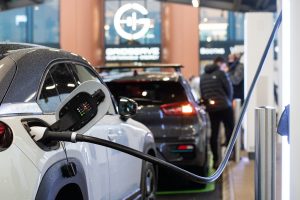The UK competition regulator has launched strong criticism Britain’s ‘inadequate’ charging network on local roads and in rural areas.
The Competition and Markets Authority (CMA) said the infrastructure is not good enough and must be improved ahead of the 2030 ban on the sale of new petrol and diesel cars.
It expressed concern about the choice and availability of places to plug in an electric car at motorway service stations.
The regulator also found the rollout of on-street charging by local authorities is ‘too slow’, while rural areas ‘risk being left behind’ due to a lack of investment in chargepoints.
The CMA cited research indicating that difficulties with charging could stop motorists switching to electric cars.
Other key issues raised included anxiety over the reliability of chargepoints, comparing prices and paying for charging.
Andrea Coscelli, the organisation’s chief executive, stated that electric vehicles ‘play a critical role’ in reducing carbon emissions, but the challenges of ‘creating an entirely new charging network should not be underestimated’.
He said: ‘Some areas of the rollout are going well and the UK’s network is growing – but it’s clear that other parts, like charging at motorway service stations and on-street, have much bigger hurdles to overcome.
‘There needs to be action now to address the postcode lottery in electric vehicle charging as we approach the ban on sales of new petrol and diesel cars by 2030.’
The CMA made a series of recommendations, including that the Government sets out an ‘ambitious national strategy’ for expanding charging infrastructure up to the end of the decade.
It also recommended that Whitehall define a clear role for local authorities to manage charging in their area, and establish a public body to monitor the sector.
The regulator has also launched a competition law investigation into long-term exclusive arrangements for charging at motorway service areas.
The UK has around 25,000 chargepoints, but forecasts suggest more than 10 times this amount will be needed by 2030.
The Government plans to ban sales of new petrol and diesel cars from 2030, with hybrids prohibited from 2035.
Just 11 per cent of new car registrations last year were for ultra-low emission cars.
Sue Davies, head of consumer protection policy at Which?, said: ‘The UK’s electric car charging network is confusing, disjointed and in dire need of reform to make it a viable option for all, especially those who do not have access to a private charger.
‘To ensure electric cars are a choice for most consumers, the Government should take these recommendations seriously and take the necessary steps to make the public charging network larger, simpler and more accessible than it is today.’
AA head of roads policy Jack Cousens said the availability and reliability of the public charging network is a major barrier to drivers switching from petrol or diesel cars to electric.
‘Boosting confidence here will go a long way to accelerate the uptake of electric cars,’ he said.
‘Drivers want chargepoints to be as simple as possible to use. Having multiple membership cards and apps makes the process of recharging needlessly complex and confusing.’



































